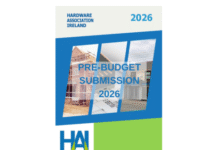The National Planning Framework is the long term, 20 year strategy for strategic planning and sustainable development of our urban and rural areas up to 2040. This in turn, is used when building each county development plan and this is voted on by councillors in every county/ local authority across the country. It determines the level of infrastructure required to underpin housing and other needs. The last framework in 2018 grossly underestimated the level of population and economic growth resulting in a shortage of infrastructure such as water and roads etc. During the summer Hardware Association Ireland (HAI) made submissions on the required housing need in each county. These reports were forwarded to all 930 councillors, Local Authority Officials and TDs. They are available on request from aoife@hardwareassociation.ie.
The Hardware Journal recently spoke with Shane McGuinness, a Fianna Fáil Councillor in the Dundalk South LEA in Louth, to get his unique perspective on the challenges that face councillors in planning and the adoption of the development plan. The discussion focused on Shane`s perception regarding his own area and Ireland’s housing and planning challenges – and what needs to change.
Required Changes
Rural Housing Reform in Ireland – Changes required
Shane expressed concerns about the decline of rural communities in Ireland due to housing shortages and government policies encouraging urban density. He underlined the need for rural housing reforms, including the elimination of the “housing need” condition and the requirement to prove local residence, as well as the consideration of housing clusters in rural areas. He stressed the need for high-density housing in urban areas, transitioning to medium and low density as one moves further from the city/ town centre. The rules on nodes in village planning, restricts development outside designated areas. Shane suggests that nodes need to be extended from villages allowing for serviced sites with appropriate infrastructure to support one-off housing. He also talked about the opposition to high density developments in an area not suited to this housing type, as it doesn’t keep within the existing pattern of the design and layout of small villages and townlands. There can be local resistance to this, and the need for low-density housing options in suburban areas should be thought out more. County councillors need to be more empowered in planning as rural communities need a voice in the decision making processes.
Streamlined Rules
Shane stressed the need for streamlined development rules across counties and highlighted disparities in current zoning practices. Different counties have varying rules and regulations and there is a disconnect between national housing policies and local implementation. The National Planning Framework aims to address these issues by providing clear policy guidelines for each county.
Density Planning – Training
Shane highlighted the lack of knowledge among many councillors about density concepts. There is a need for training and workshops for counsellors to improve their understanding of planning and development, particularly in suburban and rural housing.
He added that, many local representatives are unaware of HISCo, www.hisco.ie. HISCo’s objective is to deliver infrastructure where there is no state funding available to deliver the infrastructure in question. Building infrastructure should be a priority as the lack of water and sewage capacity is hindering house construction, leading to builders and workers leaving the country
Conversion of Empty Homes and commercial buildings to residential dwellings
Businesses should be able to apply for derelict and vacant housing grants. Shane shared his own personal experience of purchasing a derelict pub in Dundalk which was vacant for over 10 years, and the challenges he faced in obtaining grants on schemes like lease and repair and derelict grant schemes, and permissions for its conversion into apartments. Despite the project’s potential benefits, he encountered resistance from local authorities and banks on funding. There were issues with red tape, financing, and a preference he believed, for dealing with larger developers. In highlighting the challenges affecting small builders and local merchants, he emphasised the need for policy changes to support smaller projects and improve access to financing. Also, the need to help and support small builders on small projects, which are and has been the backbone of rebuilding Ireland for many years. He was also expressing frustration at the lack of action from the legislators, despite supportive rhetoric.
Sustainable Energy Community Success
Shane commented on the success of local sustainable energy communities (SECs), particularly in Dunleer, which has upgraded hundreds of homes through insulation and local advice on grants. A recent article in The Hardware Journal highlighted the Dunleer Project and its effectiveness in promoting attic, internal and external insulation, and the importance of having a sealed unit before considering heat pumps.

Shane lives in Haggardstown with his wife and children. He is actively involved with many local sporting clubs and is also the Chairperson of Haggardstown Tidy Towns.
He has a career background in construction in both Ireland and the UK.
He now works as a Health and Safety Consultant working with many large and medium size companies around Ireland.
Shane McGuinness, Fianna Fáil Councillor in the Dundalk South LEA.










